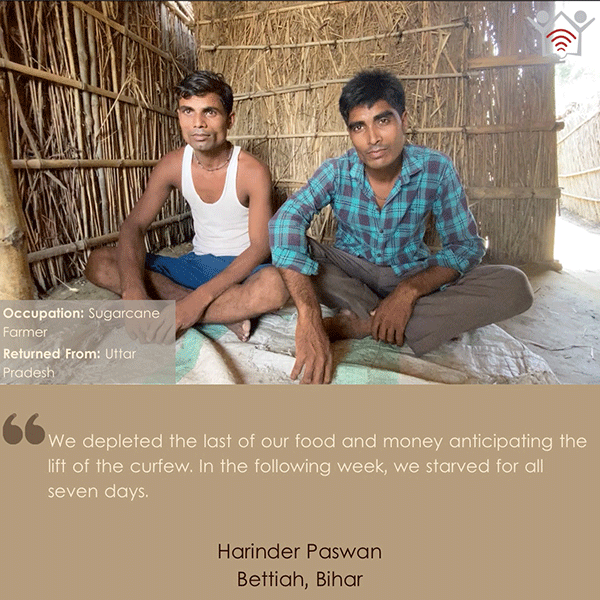Name: Harinder Paswan
Hometown: Jogapatti, Bihar
Occupation: Sugarcane Farmer
Returned from: Gunda, Uttar Pradesh
Harinder Paswan worked at a sugarcane mill with his brother in Uttar Pradesh for the past six years. The two were earning Rs. 25,000 each for their families. He first encountered the virus when the locals warned them of an active case in the neighbouring village. With the lockdown barring his only source of income and forcing him to depend on Rs. 1,500 only, Harinder and his brother starved for a week before starting their journey back to Bihar.

Interviewer: What was your reaction to the pandemic? Share the details of your journey back home.
Harinder: I first heard information about the Covid-19 virus in my village as the neighbours recommended I remain indoors and maintain distance. I isolated myself, but I needed income and food to continue living. The sugarcane mill shutdown, the police would harass on the streets, food was over, and there was not enough money to purchase more. I have been in this village in U.P. for six years now; the locals and I are acquainted enough for them to be giving us food and water for one and a half months. They were experiencing the same struggle; no job security or certainty of food. We too were a liability to them by the end.
I earned Rs. 25,000 a month from the sugarcane mill along with my brother who earns the same amount. We contribute Rs. 18,000 to the house expenditure, save a portion and use the rest for personal expenditure. I am the sole earner for my parents, wife, two daughters, and one son.
It had been almost two months; we exhausted all our possible sources of food and money. For the next seven days, we starved, contemplating the methods of transportation back home. The locals preached us the guidelines meticulously before our departure, and the sixteen of us began the walk to Bihar. We covered 150 k.m. in almost twelve hours reaching Basi by the next evening. The travel in the daytime was agonizing because of the extreme weather conditions, and lead to blisters erupting on my feet. We actively avoided the districts with a substantial number of active cases by sneaking through the sides.
I was told by the Panchayat to head to Basi since the check-up facilities were operational there. There was a Coronavirus test, followed by a state-sponsored bus-ride to the school in Bettiah. I reached the quarantine-center late that evening to isolate myself for fourteen-days.
I was given two meals a day; dal, rice, soya-beans, and vegetables. The seven of us in the room received one mask each and I purchased the sanitizer. The Mukhiya (Village Head) did not arrange all required facilities or equipment; for four days, there was no water. The guard of the building would fill our bottles from the village; however, he was inconsistent with his hours. My wrists were twisted, and I was threatened with a shove while attempting to fill water myself. How am I supposed to live without water now? All individuals at the quarantine center collectively demanded immediate water arrangements and only then did the Mukhiya arranged for it. The doctors visited four times throughout the quarantine period.
Interviewer: Has your routine been affected due to the lockdown or the pandemic?
Harinder Paswan: I have been doing odd labour work in Bettiah earning a maximum of Rs. 1,600 a month. The labour-task earns Rs. 150 a day, although, the availability of work is irregular. There is a local who lends money; I have borrowed Rs. 3,000 of which I spent Rs. 2,000 on my sister’s visit and Rs. 1,000 on purchasing food. At times, I reduce my food consumption to provide more on my family’s plate. The debt will eventually deepen as there is no work in Bihar, and the lockdown does not seem to be ending soon. The children need to survive, I will feed them however possible. They are currently at home since the school is shut, but attend tuition sessions in the neighbourhood.
I want to go back if the work restarts. There are no other options, I cannot watch my family die of starvation. I have spent the majority of my days in a year harvesting crops in Uttar Pradesh or Punjab, depending on the season. I did not expect the circumstances to reach this extreme. All these years, I paid for the food we ate until now as I was not successful at acquiring a ration card, and I do not earn enough to provide for all. A few weeks ago, there was no rice or oil for two days; we were compelled to borrow. My wife and I argue since she requires funds to run the house, but I have no viable source of income. What do I give? I would bring my children presents when I returned for a vacation. This time, I was not able to afford anything, I instead took the packet of biscuit from the quarantine center, and they accepted with a smile.
I have no expectations from the government, neither have I inquired about the schemes. Generating employment opportunities would resolve the primary worry of most migrants struggling at home.






